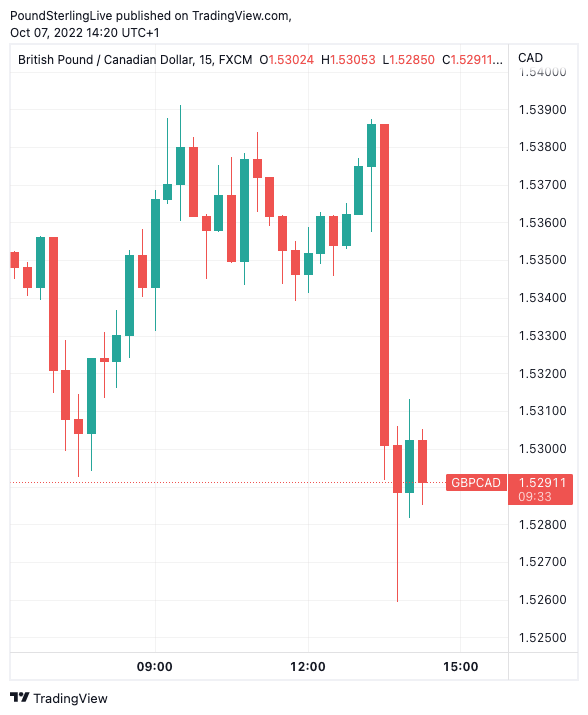Canadian Dollar Boosted by Stronger than Expected Labour Market Data, But Outlook is Decidedly Murky
- Written by: Gary Howes
-
- CAD rallies in wake of jobs report
- Employment up after string of losses
- But wage growth slowing
- Complicating outlook for CAD
- Trouble brews for Canadian mortgage holders
- Could soon be "game over" for CAD says TD Securities

Image © Adobe Stock
The Canadian Dollar was higher after the Canadian economy snapped a string of negative employment reports in September after it added 21.1K jobs over the month, however some economists warn the report was by no means a 'home run'.
This was ahead of the consensus expectation for job growth of 20K and up sharply on August's -39.7K.
The Canadian Dollar rose against the Pound and other major currencies in the wake of the numbers as they suggest the Bank of Canada is not yet in a position to consider ending its interest rate hiking cycle.
Above: GBP/CAD at 15-minute intervals showing a clear reaction to the Canadian labour market report. To better time your payment requirements, consider setting a free FX rate alert here.
The decline in Canada's unemployment rate does however mask a potentially worrying development: Statistics Canada says the decline was largely a result of fewer people searching for work.
Year-on-year wage growth remained above 5% for a fourth consecutive month, with the average hourly wages of employees rising 5.2% (+$1.57 to $31.67) compared with September 2021.
For the Bank of Canada, the message is clear: the labour market is tight and the wage increases being generated are consistent with elevated domestic inflation.
"The low unemployment rate and strong wage growth support the continued hawkish tone from the Bank of Canada Governor," says Andrew Grantham, an economist at CIBC Bank.
CIBC expects another 50 basis point hike from the Bank of Canada at the next meeting, but there are reasons to expect a slowdown from there.
"Signs that a growing number of sectors are slowing down should bring a more cautious approach from policymakers after that," says Grantham.
He notes that much of Canada's new jobs were posted in the public sector, specifically education, where seasonal issues were at play.
"Outside of that area, there was also a gain in health care, but plenty of other sectors posted declines in a sign that higher interest rates and a cooling economy are straining the labour market," says Grantham.
On this basis, the data release might not offer the Canadian Dollar a sustained lift.
At the time of writing the Pound to Canadian Dollar exchange rate (GBP/CAD) is at 1.5283, down a third of a percent on the day but still up 2.0% on the month.
Banks are offering rates of approximately 1.4853 for GBP/CAD payments, while specialist payment providers are offering rates of approximately 1.5230.
Against the Euro the Canadian Dollar is up two-thirds of a percent on the day at 1.3380, against the Dollar CAD was up 0.20% as USD/CAD retreated to 1.3711, but moves will be limited due to a strong U.S. labour market report.
Above: CAD was the best performer in the G10 following the jobs report.
Andrew Kelvin, Chief Canada Strategist at TD Securities, says "the one bright spot from the BoC's perspective was some cooling in wage growth, which fell to 5.2% from 5.6% in August."
Also, the labour market is straining to add additional jobs; "with both the 3m and 6m trend in negative territory, this report speaks to a slowing economy, and a harder landing is starting to look more likely in early 2023," he adds.
Strategists at TD Securities expect strength in the Canadian Dollar to be sold into.
The labour market report comes just a day after BoC Governor Tiff Macklem warned the central bank was in no position to pull back on its policy of raising interest rates.
Macklem pushed back against a 'dovish pivot' (such as that engaged by the Reserve Bank of Australia this week) in a speech to the Halifax Chamber of Commerce, downplaying the recent easing in the trajectory of CPI inflation.
"He seems intent on making a bad situation, worse for Canadians on the debt servicing front," says Mazen Issa, Senior FX Strategist at TD Securities of Macklem's stridently hawkish tone.
"Should Canadian CPI later this month confirm another data point of moderation or at least stability in the core measures, it's likely game over for the CAD," he adds.
Canada's households are more indebted than those in other developed nations, meaning any rise in central bank interest rates will hurt them harder.
It suggests the Canadian economy might be more vulnerable to rate hikes than elsewhere, meaning it could slow down more, and faster.
"A streak of four consecutive monthly employment losses in Ontario reinforces our view that that province will be among the hardest-hit in the coming housing-led Canadian recession," says Marc Desormeaux, Principal Economist at Desjardins Bank.
This poses downside risks to the Canadian Dollar; where rate hikes at the central bank once were supportive, they could be downright negative going forward.
"The combination of unrelenting hawkishness and lagged Canadian data suggests upside risk to our terminal rate forecast of 4.25%, which in turn raises the risk of a recession in 2023H1," says Kelvin.


